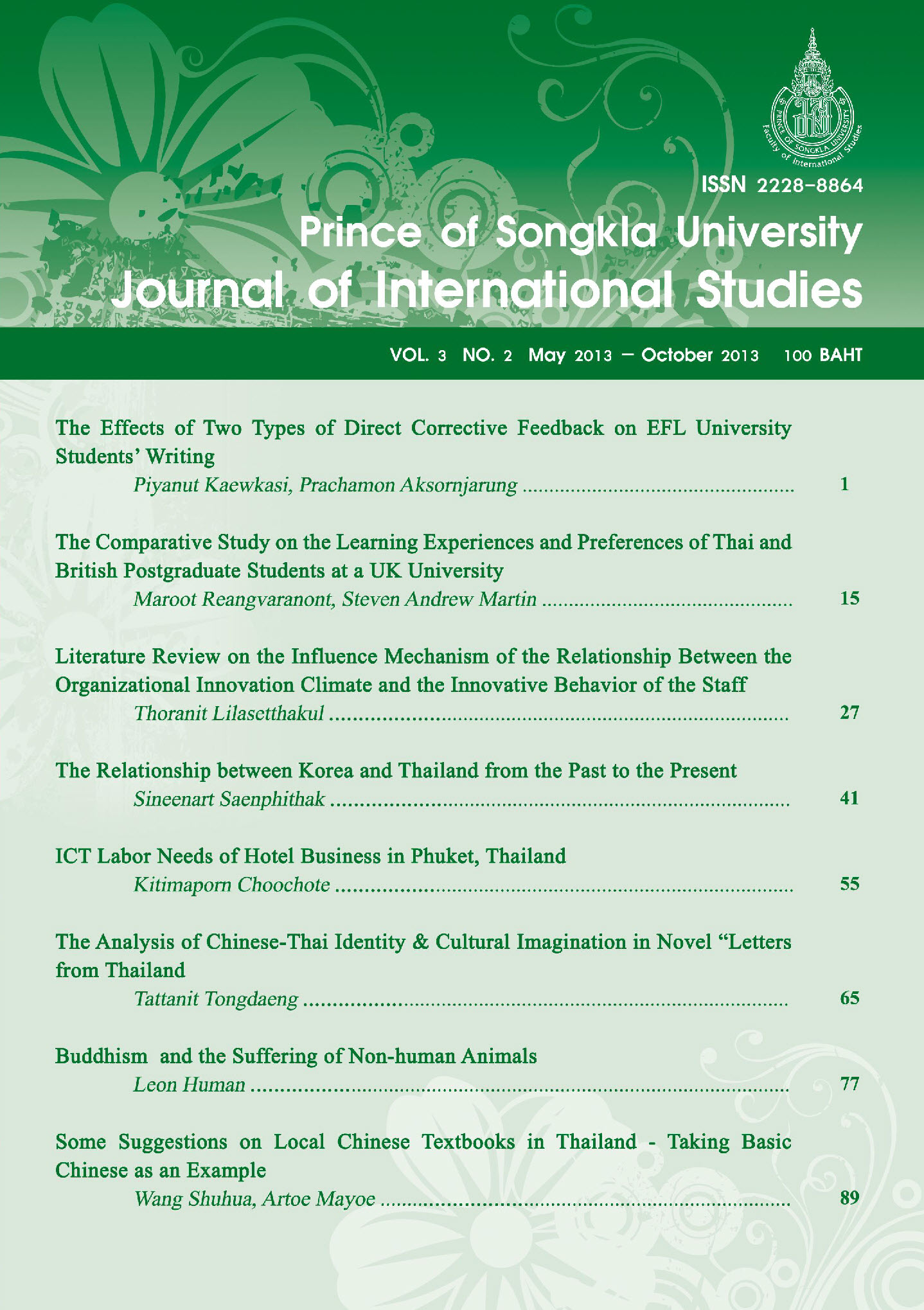ICT Labor Needs of Hotel Business in Phuket,Thailand
Main Article Content
Abstract
The research aimed to study needs of Information and Communication Technology (ICT) labors in response to human resource development among hotel businesses in Phuket Province. It was a quantitative research conducting via a survey. 255 hotel businesses were subjects in this study. A questionnaire was utilized as a research instrument in order to find frequency and percentage. The responses derived from the questionnaire were also analyzed. The findings showed that most hotels outsource to operate the ICT department and there is no permanent ICT staff except EDP (Electric Data Processing). ICT staff is mostly responsible for administering the Internet systems and networks. Additionally, it was found that most hotels do not need full time ICT staff from 2013 to 2015. Most of the hotels require ICT staff to have high competence and good personality. The ICT staff is required to be good at conversation and communication in foreign languages, especially in English. Besides, problem solving skills for clients and colleagues are very necessary for ICT staff in the hotel business.
Article Details
Statements and opinions expressed in articles herein are those of the authors and do not necessarily reflect the position of the editors or publisher.
Article, information, text, image, etc. which are published in Journal of International Studies, belong to Journal of International Studies. If anybody or any organization would like to use part or whole of them, they must receive written permission from Journal of International Studies before usage.
References
Association of Thai Travel Agents. (2012). Project development plan to support the liberalization of travel services. Retrieved from
http://www.atta.or.th/Upload/News/228/Chapter_4.pdf.
Community development Department, Ministry of Interior. (2012). The eleventh national economic and social Development Plan. Retrieved from http:// www.cdd.go.th.Denney G. Rutherford. (1990). Hotel management and operations. New York: Van Nostrand
Reinhold.
Department Of Skill Development. (2005). Direction and the need for skilled labor industry of Thailand (2004-2009). Planning and Information Technology Division, Ministry of Labour.
National Electronics and Computer Technology Center.(n.d.). Executive summary: the second Thailand information and communication technology (ICT) master plan (2009-2013). National Science and Technology Development Agency. Ministry of science and
technology.
Office of the National Economic and Social Development Board.(2011). The eleventh national economic and social development plan B.E. 2555-2559(A.D. 2012-2016). Office of the Prime Minister, 2011. Retrieved from http://www.nesdb.go.th/Portals/0/news/plan/p11/plan11.pdf.(2012).
Pimravee Taharnkrawe, and Jirawat Samitsant. (2011). Information technogy for hotel. Suan Dusit Rajabhat University. M & M Laser Printed.
Ranee Hisichaikun. (2003). Tourism management information system (unit 1 basic knowledge about the tourism industry). Sukhothai Thammathirat Open University.
Rodolfo Baggio. (2004). Information and communication technologies in the hospitality industry: the Italian case. e-Review of Tourism Research (eRTR), Vol.2, No. 5. Retrieved from http://ertr.tamu.edu.
Sirawit Sirirak. (2012). Relationship between information and communication technology (ICT) adoption and hotel productivity: the case of Phuket, Thailand. Faculty of Technology and Environment, Prince of Songkla University, Phuket.
Steadmon, C. E. & Kasavana, M. L.(1988). Managing front office operations. East Lansing, MI: The Education Institute of the American Hotel & Motel Association.
Supanee Sengsee, (2003). Information and communication technologies for education. Faculty of Education: Naresuan University.
Tanja Mihalic,. Dimitrios Buhalis. (2012). ICT as a new competitive advantage factorcase of small transitional hotel sector. Economic and Business Review. Vol.15. No. 1 (33-56).


